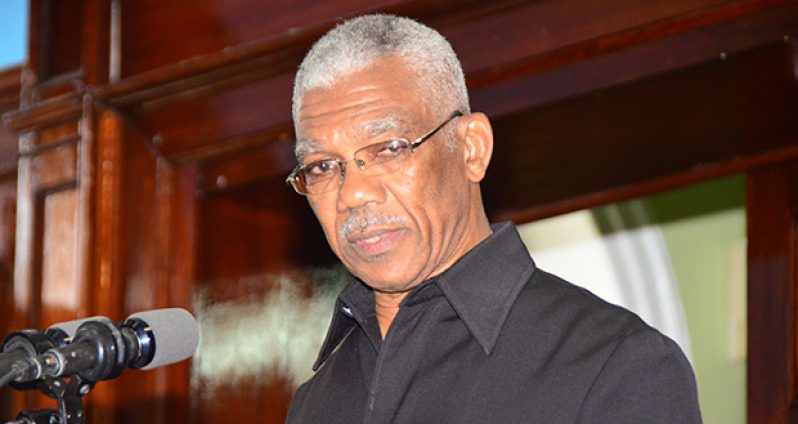PRESIDENT David Granger has announced that his administration will roll out a National Drug Strategy Master Plan while simultaneously establishing the National Anti-Narcotic Agency (NANA). Based on the theory that criminal violence results from the drug trade, President Granger said although the crime wave has long ended and the “so-called ring leaders” of the perceived drug gang warfare are “all gone”, there is still a high level of crime.
According to him, part of the reason is the inability to eradicate the narcotics trade, “gun running and their associated ills”.
Speaking on the weekly programme “The Public Interest”, the President said in an effort to create a dent in the narco-trade, his administration would be moving to adapt the National Drug Strategy Master Plan.
In his book “Public Security – Criminal Violence and Policing in Guyana”, Granger recalled that in 1992, Home Affairs Minister Feroze Mohamed had inherited a counter-narcotics plan dubbed “Guyana’s Strategy for Dealing with the Drug Problem” and a National Drug Law Enforcement Committee, which received regular reports from an active Joint Anti-Narcotics Operations Committee.
The plan and committee were established in 1988, but were discontinued following the change in administration in 1992.
However, in 1997, the PPP/C administration launched the “National Drug Strategy Master Plan 1997-2000”, and subsequently established a National Anti-Narcotics Commission. However, it was not until 2005 that the third plan was launched. The plan was subsequently shelved by the PPP/C.
But though the current plan has some deficiencies and loopholes, the government through the Public Security Ministry will implement aspects of the plan and make necessary changes as time progresses.
Work in progress
“This is a work in progress. We will see what is workable and implement those parts that are workable,” President Granger said, noting that the establishment of NANA is one of the major developments emanating from the plan. He was also optimistic that transnational crimes such as contraband, smuggling, people smuggling, and gun-trafficking would also be brought under control.
The launching of the NANA would ultimately result in the merging of the Police Narcotics Unit and the Customs Anti-Narcotics Unit (CANU).
Security Sector Reform Action Plan
Meanwhile, the President also said that the government has consulted with the UK Government to reintroduce the Security Sector Reform Action Plan – a project which was shelved by the previous People’s Progressive Party/Civic (PPP/C) Administration.
Mr Granger disclosed that while attending the United Nations (UN) General Assembly in September, he had met with Prime Minister David Cameron and made a formal request for the reintroduction of the Security Sector Reform Action Plan.
In 2009, the UK Government had offered its assistance to finance the project but the PPP/C administration had declined the offer, contending that the British Law Enforcement would have had a leading role in its implementation.
Although, Prime Minister Cameron has not responded to the request to date, President Granger is convinced that the proposal will be considered.
On a different note, Granger said he is satisfied with the progress made thus far in the crime fight.
“Although crimes are being committed, there are better responses, better investigations and there will be more prosecutions,” he said.
However, the President underscored the importance of assessing some of the social factors that may be contributing factors to crime. “We need to look not only at crime but the causes of crime.”
“There have been rapes, there have been murders. These are not crimes which are preventable by the state. We can investigate, we can prosecute, but we need to bring about certain changes in our society,” he said.



.jpg)










